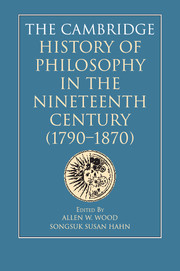Book contents
- Frontmatter
- Contents
- Contributors
- Preface
- Abbreviations
- Introduction
- I Philosophy in the Nineteenth Century
- II Logic and Mathematics
- III Nature
- IV Mind, Language, and Culture
- 8 Psychology
- 9 Language
- 10 The Emergence of the Human Sciences from the Moral Sciences
- 11 The Beautiful and the Good
- V Ethics
- VI Religion
- VII Society
- VIII History
- References
- Index
- References
9 - Language
from IV - Mind, Language, and Culture
Published online by Cambridge University Press: 05 December 2012
- Frontmatter
- Contents
- Contributors
- Preface
- Abbreviations
- Introduction
- I Philosophy in the Nineteenth Century
- II Logic and Mathematics
- III Nature
- IV Mind, Language, and Culture
- 8 Psychology
- 9 Language
- 10 The Emergence of the Human Sciences from the Moral Sciences
- 11 The Beautiful and the Good
- V Ethics
- VI Religion
- VII Society
- VIII History
- References
- Index
- References
Summary
This chapter focuses on nineteenth-century philosophy of language, conceived broadly in chronology but more narrowly in theme (for the most part, developments that occurred in such closely related fields as linguistics and formal logic have been bracketed out).
Nineteenth-century philosophy of language emerged from the background of a revolution in thinking about the subject that had taken place in eighteenth-century Germany, overturning standard Enlightenment preconceptions. Herder (1744–1803) and to a lesser extent Hamann (1730–88) were the main protagonists of this revolution. Among the revolutionary principles they championed, the following are most important:
Thought is essentially dependent on and bounded by language – that is, one can only think if one has a language, and one can only think what one can express linguistically. (Let us call this the thought-language principle.)
Meanings or concepts consist, not in the sorts of items, in principle independent of language, with which much of the philosophical tradition has equated them – for example, referents, Platonic forms, or the mental “ideas” favored by the British Empiricists and others – but in word-usages. (Let us call this the meaning-usage principle.)
Meanings or concepts are of their very nature based in (perceptual and affective) sensations – though this grounding can involve metaphorical extensions, and in the case of human beings a converse dependence (of sensations on concepts) holds as well. (Let us call this the meaning-sensation principle.)
Reference to particulars is never direct but is always mediated by general concepts, or “universals.” (Let us call this the principle of indirect reference.)
Mankind exhibits deep linguistic and conceptual-intellectual diversities, especially between different historical periods and cultures, but even to some extent between individuals living within a single period and culture. (Let us call this the diversity principle.)
Language – and hence also thought, human mental life more generally, and indeed the very self – is fundamentally social in nature. (Let us call this the language-sociality principle.)
Metaphysical philosophy is largely the product of confusions about language – in particular, disregard of principles (1), (2), and (3). (Let us call this the principle of metaphysics as linguistic confusion.)
…
- Type
- Chapter
- Information
- Publisher: Cambridge University PressPrint publication year: 2012
References
- 1
- Cited by



